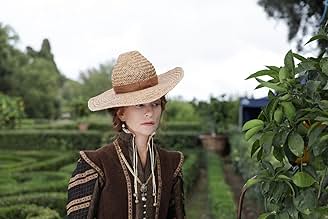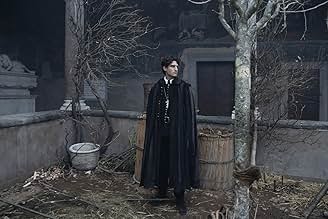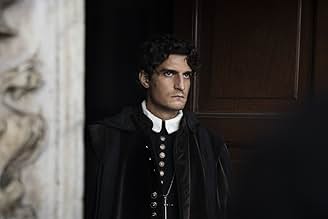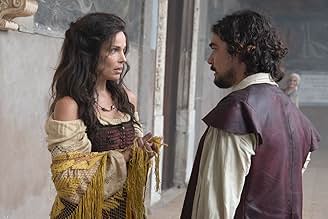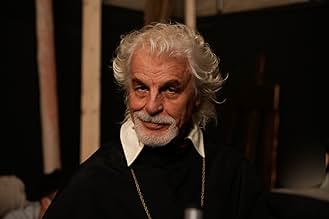IMDb-BEWERTUNG
6,5/10
1917
IHRE BEWERTUNG
Die katholische Kirche ermittelt heimlich gegen Caravaggio, während der Papst abwägt, ob er ihn wegen der Ermordung eines Rivalen begnadigen soll.Die katholische Kirche ermittelt heimlich gegen Caravaggio, während der Papst abwägt, ob er ihn wegen der Ermordung eines Rivalen begnadigen soll.Die katholische Kirche ermittelt heimlich gegen Caravaggio, während der Papst abwägt, ob er ihn wegen der Ermordung eines Rivalen begnadigen soll.
- Regie
- Drehbuch
- Hauptbesetzung
- Auszeichnungen
- 13 Gewinne & 6 Nominierungen insgesamt
Empfohlene Bewertungen
I have watched the movie at the cinema, in Timisoara. The movie looks to carefully illustrate the life of the painter. The actors and the actresses are very nice interpretating their roles. The scenes, the costumes, the colours and the decorations are very loyal to the XVII secol, when Caravaggio lived. The main actor, playing as Caravaggio, is a great actor, full of passion.
It is interesting, and still present on our days) the conflict in understanding what is the good and what is bad, because the bad can be find in good and viceversa. And of course, this is an unique truth for each of us.
Even the movie is 2 hours long, I have not figured out when the time passed.
Congratulations to all actors and for the entire team of the movie!
It is interesting, and still present on our days) the conflict in understanding what is the good and what is bad, because the bad can be find in good and viceversa. And of course, this is an unique truth for each of us.
Even the movie is 2 hours long, I have not figured out when the time passed.
Congratulations to all actors and for the entire team of the movie!
Carravaggio
For fully appreciate this movie, it help to be a fan of the work of the painter ...as one understand more what was the motivation behind his choices , and why his works were so controversial yet so good...the Catholic Church at the time was the Church, the only one yet the rise of what would become the Protestant churches were making the Vatican nervous.
The conflict between the reality of life of the average people and the grandiose representation of the saints ...had no much income ...
Knowledge of some of the work of Caravaggio help understanding lots of scenes in this movie ...and what makes his work so good is what was no conceivable at the time...that you could use the face of common daily people to personified a saint , an angel ..which of my God of the time had no gender, no sex...
For fully appreciate this movie, it help to be a fan of the work of the painter ...as one understand more what was the motivation behind his choices , and why his works were so controversial yet so good...the Catholic Church at the time was the Church, the only one yet the rise of what would become the Protestant churches were making the Vatican nervous.
The conflict between the reality of life of the average people and the grandiose representation of the saints ...had no much income ...
Knowledge of some of the work of Caravaggio help understanding lots of scenes in this movie ...and what makes his work so good is what was no conceivable at the time...that you could use the face of common daily people to personified a saint , an angel ..which of my God of the time had no gender, no sex...
The movie is the story of Michelangelo Merisi da Caravaggio who was an Italian painter in the 16th century, through the eyes of the Pope's investigator. He was known for painting "what he saw", some kind of reality that he wanted close to the divine, which was of course not ok with the Catholic Church. Within his paintings, you could see famous prostitutes, hoboes, represented as saints, such as Mary or St Peter. His life has multiple legends around it, he was known to have sexual relationships with both males and females, while painting for the Church, and his competitors tried to destroy him for that. He had to flee Rome after killing (accidentally?) someone and lived in Naples, Sicily, Malta, etc. The story of the movie is a bit long, but this is not why you should see this movie. The whole movie is staged as a painting, with that kind of atmosphere that you get from 16th century Italian paintings. Would I watch it again? No, but I am happy I watched it.
L'Ombra di Caravaggio promises a fiery portrait of a tortured genius and instead delivers two hours of overwrought mood lighting, erratic time jumps, and enough theatrical whispering to power an entire semester at drama school.
The film adopts the now-inescapable "non-linear" structure, which in this case means the plot zigzags like a drunk fencing master. Sure they toss in a few time markers, but stylistically it's all one long, indistinguishable swirl of tormented men in cloaks.
Our anti-hero Caravaggio is painted (pardon the pun) as your typical Renaissance bad boy: rebellious, tortured, bisexual, brooding, but also - plot twist! - a devout Catholic. Because nothing screams "believable complexity" like orgies one minute and confessions the next. He's supposed to feel radical, but ends up as a kind of art-school Jesus with eyeliner.
Enter "Ombra," the Church's enforcer and a villain so laughably named it's amazing no one bursts out laughing when he introduces himself. Shadow, really? Why not just call him "Father Oppression" and be done with it? He spends most of the film lurking in corners and embodying the Vatican's greatest hits: repression, judgment, and fabulous robes.
As far as the orgies are concerned, we didn't need quite so many scenes of candlelit debauchery, complete with bored courtesans, snarling pigs, and pouting boys.
To pad things out between the sex and the brooding, the film indulges in lavish re-creations of Caravaggio's paintings, which are admittedly striking - if you enjoy watching actors pose like a diorama in a museum gift shop. At times, it feels less like a biopic and more like an over-budgeted PowerPoint presentation on Baroque composition.
And then there's the ending. Since history has left Caravaggio's death ambiguous, the filmmakers go full fan-fiction and cook up a finale that manages to be both absurd and deeply unsatisfying. One almost expects him to ascend into a ray of divine light, paintbrush in hand.
On the plus side the lighting is gorgeous. Every scene looks like it's been lit by angels and Instagram filters. But beautiful visuals can only carry you so far when the script feels like a Gregorian soap opera.
The film adopts the now-inescapable "non-linear" structure, which in this case means the plot zigzags like a drunk fencing master. Sure they toss in a few time markers, but stylistically it's all one long, indistinguishable swirl of tormented men in cloaks.
Our anti-hero Caravaggio is painted (pardon the pun) as your typical Renaissance bad boy: rebellious, tortured, bisexual, brooding, but also - plot twist! - a devout Catholic. Because nothing screams "believable complexity" like orgies one minute and confessions the next. He's supposed to feel radical, but ends up as a kind of art-school Jesus with eyeliner.
Enter "Ombra," the Church's enforcer and a villain so laughably named it's amazing no one bursts out laughing when he introduces himself. Shadow, really? Why not just call him "Father Oppression" and be done with it? He spends most of the film lurking in corners and embodying the Vatican's greatest hits: repression, judgment, and fabulous robes.
As far as the orgies are concerned, we didn't need quite so many scenes of candlelit debauchery, complete with bored courtesans, snarling pigs, and pouting boys.
To pad things out between the sex and the brooding, the film indulges in lavish re-creations of Caravaggio's paintings, which are admittedly striking - if you enjoy watching actors pose like a diorama in a museum gift shop. At times, it feels less like a biopic and more like an over-budgeted PowerPoint presentation on Baroque composition.
And then there's the ending. Since history has left Caravaggio's death ambiguous, the filmmakers go full fan-fiction and cook up a finale that manages to be both absurd and deeply unsatisfying. One almost expects him to ascend into a ray of divine light, paintbrush in hand.
On the plus side the lighting is gorgeous. Every scene looks like it's been lit by angels and Instagram filters. But beautiful visuals can only carry you so far when the script feels like a Gregorian soap opera.
The hypocrisy of key Church figures who condemn the sensuality of the painter, all the while competing to hoard his art seems bizarre, the figure of Caravaggio becomes an attractive and sympathetic revolutionary hero in a secular era. While his animalistic rutting grosses me out he gets the best lines. The investigator who travels around interviewing witnesses is so intent on his task he becomes one-dimensional. But the film suffers from such poor narrative construction that it becomes tedious and repetitive, gradually dulling my interest. If the powerful originality of the artist's output were shown more clearly I would have found it more enjoyable.
Wusstest du schon
- WissenswertesRiccardo Scamarcio said about Caravaggio's character: "I immediately thought that [Caravaggio] was like Elvis Presley. My reference was Elvis. A small-town boy with great energy, passion, talent and rigor towards art. At that time, painting was the mainstream, there was nothing else, there was no photography, there was no radio, television or cinema. Paintings were so powerful because they spoke directly to the unconscious. And this man was the first to represent sacred images in a completely different way."
- PatzerAlle Einträge enthalten Spoiler
Top-Auswahl
Melde dich zum Bewerten an und greife auf die Watchlist für personalisierte Empfehlungen zu.
- How long is Caravaggio's Shadow?Powered by Alexa
Details
Box Office
- Budget
- 12.261.966 € (geschätzt)
- Weltweiter Bruttoertrag
- 4.895.695 $
- Laufzeit
- 2 Std.(120 min)
- Farbe
- Seitenverhältnis
- 2.39 : 1
Zu dieser Seite beitragen
Bearbeitung vorschlagen oder fehlenden Inhalt hinzufügen

